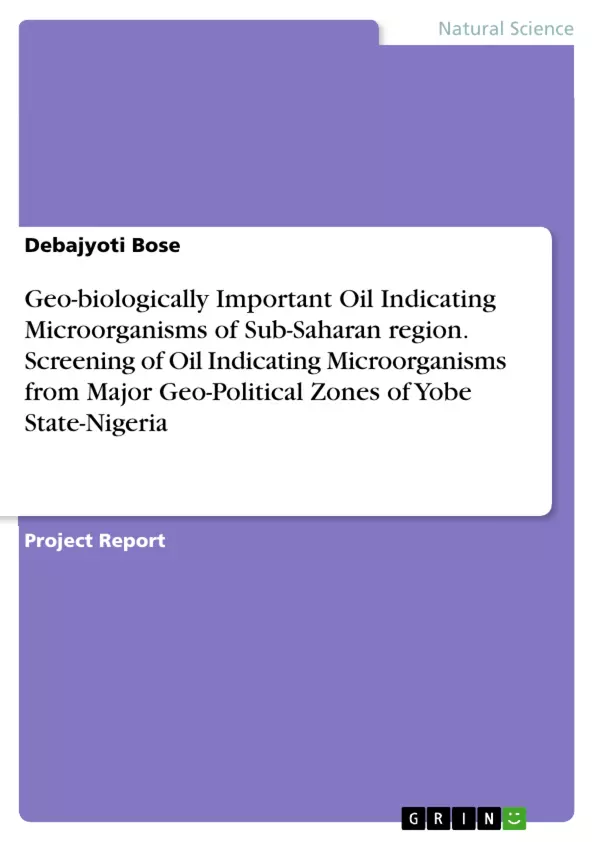Ancient rocks and natural oils are rich with abundant and hidden information of ancient organic matters responsible for earth formation, including molecular and isotopic signatures of the organisms that existed at the time the organic matter was formed. Considering the above facts of astrobiology, research study was carried out on screening of oil indicating microorganisms from oil contaminated sites of major geo-political zones of Yobe State, Nigeria including Damaturu, Gashua, Potiskum and Nguru local Government areas.
Serial dilution was performed for all soil samples collected from the oil contaminated sites of mentioned local government areas followed by culture isolation and identification techniques for bacterial samples only. Nutrient agar was used for the isolation of the bacteria from the soil samples and mixed cultures were obtained. These bacterial cultures were inoculated in petroleum in order to see their oil utilizing capability. Two types of culture showed positive results among all isolated colonies. Rhizoid shaped gram positive rods isolated from soils of Damaturu, Gashua, Potiskum and Nguru & yellow pigmented gram negative bacterial colony isolated from soils of Potiskum and Nguru showed oil utilizing ability by positive growth in the refined crude oil (Petroleum, Diesel, etc.).
The oil utilizing ability of those specific bacteria shows their potentiality in detecting the presence of oil and acting as potential oil indicators in Sub-Saharan region of African Continent caring a long history of bio-geo sciences. Findings from the present research work may create an opening for encouraging the geo-biological potentials of West African Countries in astrobiological aspects.
Inhaltsverzeichnis (Table of Contents)
- CHAPTER ONE GENERAL INTRODUCTION
- 1.0. Introduction
- 1.1. Background of the Study
- 1.2. Statement of the Problem
- 1.3. Research Questions
- 1.4. Aim and Objectives (Purpose) of the Study
- 1.5. Significance of the Study
- 1.6. Scope and Limitation of the Study
- 1.7. Operational Definition of Terms
- CHAPTER TWO LITERATURE REVIEW
- 2.0. Introduction
- 2.1. Microbial Techniques for Hydrocarbon Exploration
- 2.2. Methane Oxidizing Bacteria
- 2.2.1. Microbial Oxidation of Methane
- 2.3. Ethane, Propane and Butane Oxidizing Bacteria
- 2.3.1. Microbial Oxidation of Ethane, Propane and N-Butane
- 2.4. Sample Collection Method
- 2.5. Isolation of Hydrocarbon Oxidizing Bacteria
- 2.6. Molecular Biology Techniques
- CHAPTER THREE MATERIALS AND METHODS
- 3.1. Collection of Soil Samples
- 3.2. Isolation of Bacteria from Soil Samples
- 3.2.1. Serial Dilution
- 3.2.2. Media Preparation and Sterilization
- 3.2.3. Spread Plate Method
- 3.3. Gram's staining
- 3.4. Application of Oil Utilizing Bacteria
- CHAPTER FOUR RESULTS AND DISCUSSION
- 4.1. Results
- 4.1.1. Colony Characterization
- 4.1.3. Observation for Application of Oil Utilizing Bacteria
- 4.2. Discussion
Zielsetzung und Themenschwerpunkte (Objectives and Key Themes)
This research project investigates the presence of oil-indicating microorganisms in various geo-political zones of Yobe State, Nigeria. The study aims to identify and analyze the potential of these microorganisms as indicators for oil exploration in the Sub-Saharan region. The project is based on the assumption that ancient rocks and oil deposits contain traces of ancient organisms, offering insights into the geological history and potential resource wealth of the region.
- Identification of oil-indicating microorganisms in soil samples from oil-contaminated sites.
- Characterization of the oil-utilizing capabilities of identified microorganisms.
- Exploration of the potential of these microorganisms as bio-indicators for oil exploration.
- Assessment of the geo-biological potential of West African countries in astrobiological research.
- Contribution to the understanding of the role of microorganisms in hydrocarbon exploration.
Zusammenfassung der Kapitel (Chapter Summaries)
Chapter One provides a general introduction to the research project, outlining the background, objectives, and significance of the study. Chapter Two presents a comprehensive literature review on microbial techniques for hydrocarbon exploration, focusing on methane, ethane, propane, and butane oxidizing bacteria. It also explores sample collection methods, isolation techniques, and molecular biology techniques. Chapter Three details the materials and methods employed in the research project, including soil sample collection, bacterial isolation, and analysis of oil-utilizing capabilities. Chapter Four presents the results and discussion, analyzing the characteristics of isolated bacterial colonies and their ability to utilize oil. This chapter also explores the implications of these findings for oil exploration and bio-geo sciences in the region.
Schlüsselwörter (Keywords)
The key terms and concepts explored in this research project include geo-political zones, oil indicators, bacteria, refined crude oil, bio-geo sciences, astrobiology, and microbial techniques for hydrocarbon exploration.
Frequently Asked Questions
What are oil-indicating microorganisms?
These are specific bacteria that have the ability to utilize refined crude oil (like petroleum or diesel) for growth. Their presence in soil can indicate the proximity of natural oil deposits.
Where was this research conducted?
The study focused on major geo-political zones of Yobe State, Nigeria, specifically in Damaturu, Gashua, Potiskum, and Nguru.
Which types of bacteria were identified as oil indicators?
The research identified rhizoid-shaped gram-positive rods and yellow-pigmented gram-negative bacterial colonies as having significant oil-utilizing capabilities.
How can these microorganisms help in oil exploration?
By screening soil for these specific bacteria, geologists can potentially detect oil reserves more efficiently, using them as bio-indicators for hydrocarbon deposits.
What is the significance of this study for West Africa?
It highlights the geo-biological potential of the region and encourages further astrobiological and bio-geo science research in West African countries.
- Quote paper
- Dr. Debajyoti Bose (Author), 2014, Geo-biologically Important Oil Indicating Microorganisms of Sub-Saharan region. Screening of Oil Indicating Microorganisms from Major Geo-Political Zones of Yobe State-Nigeria, Munich, GRIN Verlag, https://www.grin.com/document/341767



